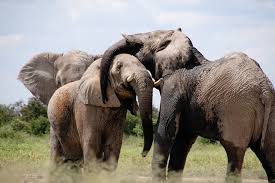Elephants are the largest living mammal on the land. They are very social. Elephants use various methods to communicate with other elephants. These communication methods vary from trumpets to low frequency infrasound that human beings cannot hear. But they do communicate wide variety of feelings and intentions, including readiness to attack, caring for youngsters, resolving disputes, alerting others, defending territories and keeping track while moving as a herd. Different parts of the body like the trunk, ears and tails, voices and body languages play vital roles in communication of emotions and feelings. Sound, smell, vision and touch are effectively utilized for proper communication.

Trunks are used by elephants to convey a wide range of emotions. The way of holding of trunk by an elephant is an indication to the opponent whether it is going to attack or defend. Trunks are used in caring younger ones and exploring body of other elephants. They assess the feelings of other elephants by smelling and touching them with trunks. They pay respect to dead elephants by touching the body using trunks.
Elephants communicate through smells too. Flapping ears indicates joy and excitement. The sound generated by beating the ears on the skin is a message to other elephants to get in touch. The tail is used to probe the surroundings. They communicate with each other over great distances by using their voices and hearing power. Low frequency infra sounds are used to communicate over great distance. Quite rumbling or purring is used to greet fellow elephants. Calves bellow loudly for their mothers when they feel lost. Trumpets are indications of anxiety or readiness to attack. When being attacked also, elephants resort to trumpeting.
Synchronized freezing is a special feature which is employed by elephants collectively whereby they stop and peak their senses. This allows them to probe the environment for unfamiliar or threatening noises and smells.
Next time, when you seen an elephant standing steady with raised head and sticking out ears, remember that it may be listening to a message that is inaudible to you.
How does a dog sense smell better than us?
Why is it difficult to identify smell of fruits in a fridge?

